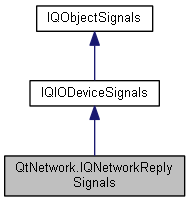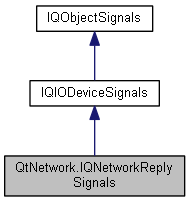|
Qyoto
4.0.5
Qyoto is a C# language binding for Qt
|
|
Qyoto
4.0.5
Qyoto is a C# language binding for Qt
|


Public Member Functions | |
| void | MetaDataChanged () |
| | |
| void | Finished () |
| | |
| void | Error (QNetworkReply.NetworkError arg1) |
| | |
| void | SslErrors (System.Collections.Generic.List< QSslError > errors) |
| | |
| void | UploadProgress (long bytesSent, long bytesTotal) |
| | |
| void | DownloadProgress (long bytesReceived, long bytesTotal) |
| | |
 Public Member Functions inherited from QtCore.IQIODeviceSignals Public Member Functions inherited from QtCore.IQIODeviceSignals | |
| void | ReadyRead () |
| | |
| void | BytesWritten (long bytes) |
| | |
| void | AboutToClose () |
| | |
| void | ReadChannelFinished () |
| | |
 Public Member Functions inherited from QtCore.IQObjectSignals Public Member Functions inherited from QtCore.IQObjectSignals | |
| void | Destroyed (QObject arg1) |
| void | Destroyed () |
| | |
| void QtNetwork.IQNetworkReplySignals.DownloadProgress | ( | long | bytesReceived, |
| long | bytesTotal | ||
| ) |
This signal is emitted to indicate the progress of the download part of this network request, if there's any. If there's no download associated with this request, this signal will be emitted once with 0 as the value of both bytesReceived and bytesTotal.
The bytesReceived parameter indicates the number of bytes received, while bytesTotal indicates the total number of bytes expected to be downloaded. If the number of bytes to be downloaded is not known, bytesTotal will be -1.
The download is finished when bytesReceived is equal to bytesTotal. At that time, bytesTotal will not be -1.
Note that the values of both bytesReceived and bytesTotal may be different from size(), the total number of bytes obtained through read() or readAll(), or the value of the header(ContentLengthHeader). The reason for that is that there may be protocol overhead or the data may be compressed during the download.
See also uploadProgress() and bytesAvailable().
| void QtNetwork.IQNetworkReplySignals.Error | ( | QNetworkReply.NetworkError | arg1 | ) |
Returns the error that was found during the processing of this request. If no error was found, returns NoError.
See also setError().
| void QtNetwork.IQNetworkReplySignals.Finished | ( | ) |
This signal is emitted when the reply has finished processing. After this signal is emitted, there will be no more updates to the reply's data or metadata.
Unless close() has been called, the reply will be still be opened for reading, so the data can be retrieved by calls to read() or readAll(). In particular, if no calls to read() were made as a result of readyRead(), a call to readAll() will retrieve the full contents in a QByteArray.
This signal is emitted in tandem with QNetworkAccessManager::finished() where that signal's reply parameter is this object.
Note: Do not delete the object in the slot connected to this signal. Use deleteLater().
You can also use isFinished() to check if a QNetworkReply has finished even before you receive the finished() signal.
See also setFinished(), QNetworkAccessManager::finished(), and isFinished().
| void QtNetwork.IQNetworkReplySignals.MetaDataChanged | ( | ) |
This signal is emitted whenever the metadata in this reply changes. metadata is any information that is not the content (data) itself, including the network headers. In the majority of cases, the metadata will be known fully by the time the first byte of data is received. However, it is possible to receive updates of headers or other metadata during the processing of the data.
See also header(), rawHeaderList(), rawHeader(), and hasRawHeader().
| void QtNetwork.IQNetworkReplySignals.SslErrors | ( | System.Collections.Generic.List< QSslError > | errors | ) |
This signal is emitted if the SSL/TLS session encountered errors during the set up, including certificate verification errors. The errors parameter contains the list of errors.
To indicate that the errors are not fatal and that the connection should proceed, the ignoreSslErrors() function should be called from the slot connected to this signal. If it is not called, the SSL session will be torn down before any data is exchanged (including the URL).
This signal can be used to display an error message to the user indicating that security may be compromised and display the SSL settings (see sslConfiguration() to obtain it). If the user decides to proceed after analyzing the remote certificate, the slot should call ignoreSslErrors().
See also QSslSocket::sslErrors(), QNetworkAccessManager::sslErrors(), sslConfiguration(), and ignoreSslErrors().
| void QtNetwork.IQNetworkReplySignals.UploadProgress | ( | long | bytesSent, |
| long | bytesTotal | ||
| ) |
This signal is emitted to indicate the progress of the upload part of this network request, if there's any. If there's no upload associated with this request, this signal will not be emitted.
The bytesSent parameter indicates the number of bytes uploaded, while bytesTotal indicates the total number of bytes to be uploaded. If the number of bytes to be uploaded could not be determined, bytesTotal will be -1.
The upload is finished when bytesSent is equal to bytesTotal. At that time, bytesTotal will not be -1.
See also downloadProgress().